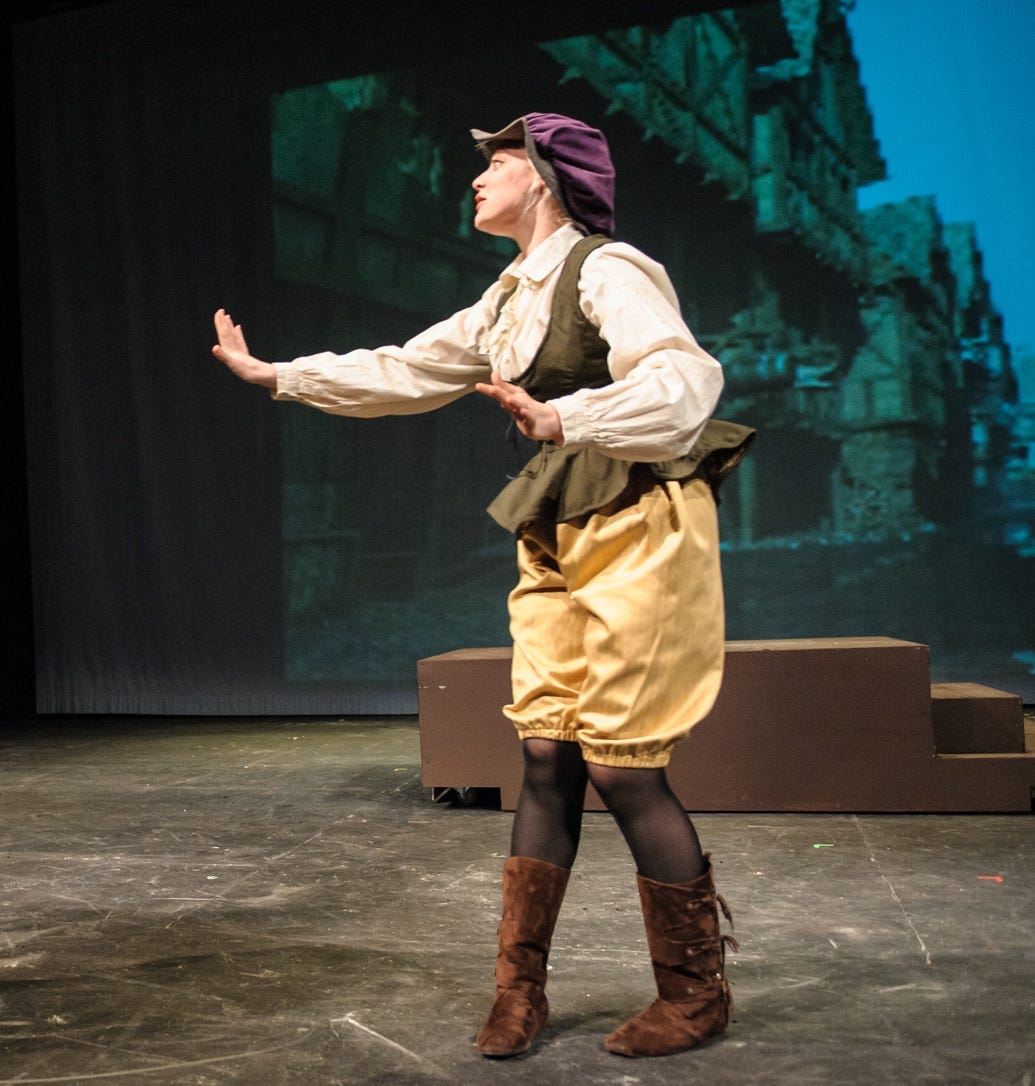Managing my Musical Expectations
On catharsis, performativity, cynicism, and if art can change the world.
Welcome back to program notes.
First, some bits and bobs:
What I've been reading: The Message by Ta-Nehisi Coates. Gorgeous, though imperfect (what isn’t); it’s as much about the power of writing as it is about imperialism’s legacies.
What I've been listening to: “Ankles” by Lucy Dacus. I am having a preemptive conniption fit over her upcoming solo album, and this horny, tender single made me swoon.
What I’ve been singing: “Lonely House” by Kurt Weill. I’m relishing my recently-turned-tenor voice (thanks, HRT) by singing this moody, soaring aria. Post on trans vocality coming soon, stay tuned!
What’s my problem with catharsis?
One of my pet peeves is the claim that “theatre changes the world.” It feels too similar to other trite phrases like “music is a universal language,” “art brings us together,” or, dare I say, “We come to this place… for magic.” A lot of my writing on musical theatre starts from a desire to complicate claims like these. This has led me to some relatively pessimistic conclusions about what theatre actually does do, or more often, what it doesn’t do.
By asking about what theatre “does,” I’m invoking J. L. Austin’s concept of performativity.1 His definition of performativity has nothing to do with theatre/theatricality—instead, calling something “performative” means that it literally does something, i.e., “performs” an action. My good friend Ky Dates recently wrote a gorgeous essay that discusses how Austin’s theory differs from other definitions of the word “performative”—you can read it here. By asking what theatre does, I’m trying to figure out what about theatre is “performative” in the Austinian sense. What does theatre actually do to create change?
“Theatre changes the world” is usually said with the naïve, full-throated enthusiasm of a high schooler who believes that their production of Seussical: The Musical will cause a fundamental shift in global circumstances if only Jeremy sings out and Lena puts her phone away and stops missing her cue and oh my GOD YOU GUYS you KNOW we’re not supposed to eat in costume. Full disclosure: I was one of those theatre kids. I was cringe, but at least I cared. By now, musical theatre and its evangelists make me roll my eyes, but I am nevertheless getting my PhD by yapping about the genre. I am still transfixed by musical theatre and the hold it can have on people, for better or for worse.

My typical issue with musicals boils down to suspicion of the catharsis they produce for audiences. “Catharsis” refers to the process of generating a negative emotion like pity or fear in the audience, and then purging that emotion. The term comes from Aristotle’s writing in his Poetics about tragedy’s effect on audiences—essentially, he believed that catharsis (katharsis in Greek) is good for society since it allows negative emotions to be processed instead of being bottled up.2 I am all for processing emotions, but I worry that the catharsis that musicals aim to create also lulls audiences into inaction outside of the theatre.
Take West Side Story, a musical frequently programmed as a part of efforts towards tolerance and racial harmony—in other words, as a piece of theatre that can change the world. West Side Story is a tragedy, so catharsis happens in a pretty traditional sense. Audiences feel the tragedy of Tony’s death and the pain of Maria’s heartbreak, and thereby might become more resolute in their belief that racial tensions are caused by a lack of introspection and kindness, or an inability to see the humanity in others. The audience is not asked to look beyond the interpersonal scuffles of the teenagers onstage for the root cause of their problems. This is why I think catharsis can be dangerous. West Side Story is invested in the belief that racism is best addressed by changing individuals’ hearts and minds. This preoccupation prevents consideration of the systemic issues simmering underneath the show’s surface. Audiences get their moral superiority and capacity for empathy reaffirmed without being pointed towards further actions to take after emerging from the theatre. Or at least, that’s what I claimed in my undergrad senior thesis.
I keep writing myself into conclusions like this, but I am growing tired of my own cynicism. I recently read the article “Infelicities” by Aaron C. Thomas which explores the many different uses of the term “performative” within the field of theatre and performance studies.3 I was surprised to find my cynicism about catharsis directly challenged by Thomas’s conclusions. He writes,
“…the constant use of performative by theatre scholars seems to me related to a faith in theatre’s ability to do things with performance, perhaps even in katharsis. This is a belief that performances are not only aesthetic objects to be observed or enjoyed but that they also make things happen in the world, and—like the promise of the Austinian performance ‘I do’—immediately produce those effects. This is a hopeful if utilitarian approach, but just as Derrida has already marked for us the inability for Austin’s performatives always or invariably to work, the theatre’s performatives are also infelicitous. Theatre, as any practitioner knows, does not change societies immediately, and to evaluate a performance’s success or failure based on its performative abilities is unfair to the form. Even more, theatre in performance is always imperfect, always failing, never quite achieving its own goals. The actor’s inflection is off tonight, the light cue is just a bit too late, the audience doesn’t get it.
[…]
What, then, do we lose when we ask performative to mean “interventional performance”—as we turn our attention to serious performances effecting change in the world? And what might we gain by examining performance as something more fleeting and less permanent, a line of flight rather than an action that either succeeds or fails to remake the world?”4
Thinking of musical theatre as a “line of flight,” as a glimmer of light rather than a beam, might help me give it more grace. Perhaps I am asking too much of the genre, or, when its practitioners claim that their work changes the world, perhaps I am expecting too much of a demonstrable impact. When did I start demanding that art give me immediate change, complete with tangible proof of that change? I still have plenty of critiques of musical theatre, especially for the Broadway industry and the effects of capitalism on the genre, but I also want to have some faith in the form.
The cynical conclusions I arrive at bother me most because I’m not a very cynical person in other areas of my life. I am stuck like a dope with a thing called hope—the world is going up in flames, yet I believe in a future, I believe in the power of community, and I do believe in the importance of art. I want to write about musical theatre in a way that honors the deep love of the form that catalyzed my critiques in the first place. Here’s to being gentle with that dorky theatre kid that I was as a teen, and trusting their earnest belief that making and witnessing art is a worthwhile pursuit, even in a burning world.
I’d love to hear from you if this sparked thoughts. How are you keeping art and hope alive? Are musicals just escapism, or do they do something? Let me know what you think.
J. L. Austin, How to Do Things with Words, Second edition (Cambridge: Harvard University Press, 1962).
“Catharsis,” in Merriam-Webster’s Encyclopedia of Literature (Springfield, MA: Merriam-Webster, Inc., 1995), https://books.google.com/books?id=eKNK1YwHcQ4C&pg=PA217#v=onepage&q&f=false.
Aaron C. Thomas, “Infelicities,” Journal of Dramatic Theory and Criticism 35, no. 2 (Spring 2021): 13–25, https://doi.org/10.1353/dtc.2021.0002. This article is likely paywalled—email me if you want access.
Thomas, “Infelicities,” 21–22. Italics in original, bolding my own.





hmmm. I hesitate to make a big sweeping statement, but I think art has been put to all these and more uses for a long time. Plus, art "for art's sake" is still political, even if it insists it's not. But that's maybe a thought for a different essay :)
Do you think that the idea that "art must create change" has gotten more intense over time? I ask b/c I feel like art for arts sake, for the community and relaxation and awe of it all, has diminished over the centuries (?). Our expectations that media must provoke action feels like the norm today, but maybe not always. -Luddite